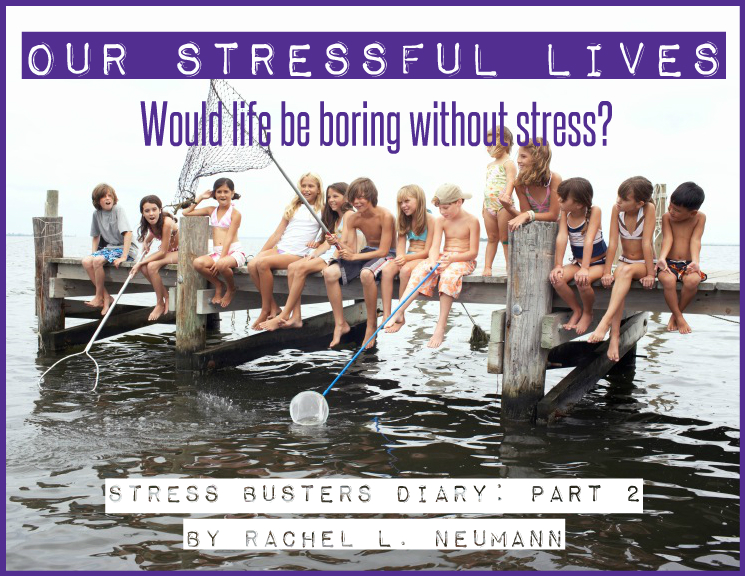Our Stressful Lives: Part 2
Would life be boring without stress?

Share:
For decades, well-known coaches, wise teachers and empowered leaders have encouraged us to just turn off the TV! Why haven't we listened?
Let’s face it — we are stress junkies! We thrive on scary movies and drama-packed TV shows. We become fixated on the TV when a news anchor pushes the envelope with a ‘News Flash,’ a ‘this just in’ or a ‘breaking story!’ In the world of news, if it doesn’t bleed, it doesn’t lead!’
Why is it that news about tornadoes, flooding and fires scintillates and captivates us in such a powerful way? Why do we tune in day after day, week after week for yet another dose of the newest drama of affliction and distress? Why haven't we learned? Why are we still listening to the news? Why? What more could we accomplish if we weren’t addicted to the hormones of stress?
What happens under stress?
Just imagine that you and I are taking a stroll through the park. It’s a beautiful, bright sunny day with a few white, fluffy clouds in the sky. We are relaxed. We’re happy, and carefree. Suddenly, a vicious, large dog pulls at his leash, threatening to break free and attack us! He is snapping, snarling, and gnashing his teeth at us! What happens physiologically?
The stomach tightens and a surge of energy flows through the body! We’re momentarily frozen in indecision. Should we run or do we fight? Suddenly the dog’s owner comes out to soothe his worried puppy and we realize that we were not in any real danger. We relax and notice that we just experienced what the body does under stressful situations — it gets ready to flee or to fight.
Wow! That was tense! That was even exciting!
And this is what the body does in every stressful situation. The heart gets ready to pump more blood to the large muscles of the body and the pulse rate raises the blood pressure. The digestive system shuts down the production of hydrochloric acid. In total, 1,400 physiological changes occur in just that moment.
Real stress vs. perceived stress.
But what if our nervous system constantly receives messages that our life is in danger, that there is a vicious, large dog after us all the time?
This is the kind of stress that we subject ourselves to each day when we tune in to trendy TV dramas of death and destruction. The nervous system does not know the difference between real life-threatening situations and imagined ones. All the while we perceive ourselves to be in danger, we are still responding physiologically to the perceived threat of the psychological thriller drama on TV.
How does the body let us know we’re experiencing unnecessary prolonged stress?
Do you ever notice that you are irritable, but for no reason at all? And then at other times you have to admit that you’re feeling depressed, even lethargic and hopeless.

Physiologically, your heart may pound at night when you are trying to sleep and keeps you awake. Your mouth feels dry. You may feel week or dizzy, or too fatigued to make dinner and feed yourself appropriately. Migraine headaches, indigestion, and difficulty sleeping at night, are also related to the stress response.
Stress is stress, whether real or imagined.
The facts are that whenever the mind perceives a threat, the body reacts to that perceived threat. The body cannot tell the difference between a REAL life-threatening situation and the unreal psychological thriller on TV. Whenever you and I see or think about something that scares us or threatens us, the body reacts in the same way as it does when a vicious, large dog or a wild animal threatens our safety.
The decision is yours and mine.
Living in a constant elevated level of stress is not healthy for us. We are smarter, healthier, and more creative in an environment of peace and tranquility. Living with constant stress dumbs us down. It makes us stupid.
Some stress we subject ourselves to is discretionary.
We don’t have to choose being in, or staying in, a particularly stressful situation. Our free will, our power of choice, is a critical part of this equation.
Next in my Stress Busters series, I will share antidotes to stress along with how to create health and prosperity in the midst of a stress-filled world.
Blessings,

Copyright 2015 © by Rachel L. Neumann of Your Pathway to Empowerment. All rights reserved. You may quote, copy, translate and link to this article in its entirety as long as you credit Rachel L. Neumann, the author by name, and include a working link back to this web page. All other uses are strictly prohibited.



